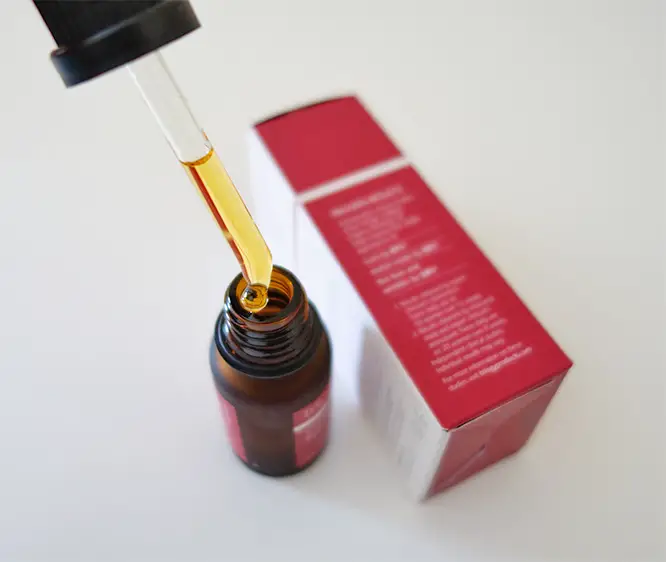Many of us, when considering a new skincare product like rosehip oil, focus primarily on its benefits and how it might transform our skin. That was certainly my approach when I first started using rosehip oil. The scent wasn’t my primary concern; I was more intrigued by its reputed skin-nourishing properties.
However, I’ve come to realize that for many, the aroma is a key consideration before they even begin using it. Contrary to popular belief, rosehip oil doesn’t share the floral fragrance of rose essential oil, despite being derived from the same plant.
If you’re curious about what rosehip seed oil actually smells like and how this relates to its quality, read on. My journey with this oil has given me some insights that might just surprise you.

Understanding the Aroma of Pure Rosehip Seed Oil
Rosehip oil, a skincare favourite, is derived from the seeds of rosehips, the small round fruits found behind the blooms of rose plants. This rich, bright orange oil is valued for its high vitamin A content and is typically extracted through cold pressing.
From my experience, pure rosehip seed oil carries a distinctly subtle earthy scent with a hint of woodiness. It’s a natural, organic fragrance that often reminds me of the crisp, aromatic air of autumn. This is what you might expect from a plant-based oil – a scent that’s more grounded in nature than artificially fragranced products.
However, it’s important to remember that the perception of scent is highly subjective. Not everyone may find the earthy tones of rosehip oil appealing. But, here’s the good news: even if you’re not fond of such aromas, the scent of rosehip oil is not overpowering and fades swiftly once applied to the skin. This was a relief for me, as I prefer skincare products that don’t leave a lingering smell.
A crucial point to note is that a fresh, quality rosehip oil should never have an unpleasant or sour odour. If you encounter a bad smell, it’s a strong indicator that the oil is rancid and should be discarded. Using rancid oil can be harmful to your skin, so always ensure the freshness of the product.
Navigating Fragrance in Rosehip Oil: What to Expect
One question I often hear is, “Can rosehip oil contain added fragrances?” The answer lies in understanding the types of rosehip oil available. Pure, 100% organic, and cold-pressed rosehip seed oil is inherently fragrance-free. This type of oil preserves the natural, subtle scent of rosehip seeds without any additional fragrances.
However, some brands do add fragrances to rosehip oil for aesthetic reasons, altering its natural scent. Additionally, there are products where rosehip seed oil is blended with other essential oils, resulting in a different aroma altogether. I’ve come across products like INIKA Organic Phyto-Active Rosehip Oil and MARYNS Scented Rosehip Oil, which offer these variations.
It’s important to consider that oils with added fragrances carry a risk of skin irritations, especially for those with sensitive or eczema-prone skin. Fragrances, often chemically produced, can be potent allergens.
Through my own experience and research, I’ve found that it’s generally safer, particularly for sensitive skin, to stick with pure rosehip oil. This ensures you get the benefits of the oil without the risk of irritation from added fragrances.
Is it normal for rosehip oil to smell fishy?
If your rosehip seed oil has a fishy smell it is an indication that the oil had gone rancid. This means that the fatty acids present in the oil have been oxidized and the actives in the oil are no longer present. Rancid oils smell sour, fishy, or bad in general.
Should rosehip seed oil smell like cooking oil?
Cooking oils are plant oils just like rosehip oil and as such have a plant-like or organic smell but they do not smell the same. For example, cold-pressed olive oil has a pun grassy scent with a hint of olives.
Does rosehip oil smell like mustard seed oil?
Contrary to rosehip oil’s earthy smell, mustard seed oil has a very pungent acrid smell. If you purchase rosehip oil that smells acrid instead of earthy, it might mean the oil is bad or it isn’t rosehip oil at oil.
How to avoid rosehip seed oil going bad quickly
Rosehip seed oil has a rather short shelf life of 6 months after which it will go rancid. Things like the colour, smell, and texture of the oil may change. To prevent this, it is important to store your rosehip oil the right way. Here are my top tips to prevent rosehip oil from smelling bad:
- Store away from direct sunlight or any source of heat as this can break down the oil.
- Always purchase oil that is packaged in a dark glass container
- Once you open your rosehip oil, store it in a fridge or in a cool area
- Do not leave your rosehip oil open and exposed to air for long, as this will speed up the oxidization process.
- Add a few drops of vitamin E oil to cold-pressed rosehip seed oil provides antioxidant activity that can increase the shelf life of the oil(only if the product doesn’t contain any)

Petra Nakashian (previously Kravos) is a dedicated natural health and beauty blogger, driven by the loss of her parents to cancer, which led her to meticulously research beauty product ingredients. With over 10 years of experience, her in-depth knowledge has made her a trusted expert in the field. Founder of Be Healthy Now and Green Beauty Talk, Petra recently expanded her expertise with Beauty Insights Hub, exploring a wider range of beauty treatments. Committed to transparency and honesty, her work is a vital resource for navigating the complex world of beauty.

